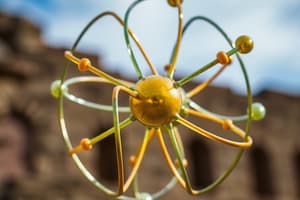Podcast
Questions and Answers
What is the meaning of the Greek word 'historia'?
What is the meaning of the Greek word 'historia'?
- Learning by inquiry (correct)
- Systematic accounting of natural phenomena
- Study of the past and present events
- Chronicling of historical data
Historical data is not important to interpret.
Historical data is not important to interpret.
False (B)
What is the difference between 'Remains' and 'Relics'?
What is the difference between 'Remains' and 'Relics'?
Remains refer to the whole, while relics refer to a part.
According to Aristotle, history is a systematic accounting of a set of natural phenomena taking into consideration the chronological arrangement of the ______________.
According to Aristotle, history is a systematic accounting of a set of natural phenomena taking into consideration the chronological arrangement of the ______________.
Match the following sources of history:
Match the following sources of history:
What type of history presents plain and basic information?
What type of history presents plain and basic information?
Unwritten sources of history are less essential than written sources.
Unwritten sources of history are less essential than written sources.
What is an example of material evidence in unwritten sources?
What is an example of material evidence in unwritten sources?
What is a primary source?
What is a primary source?
Herodotus is considered the 'Father of Mathematics'.
Herodotus is considered the 'Father of Mathematics'.
What is the name of the theory that suggests the history of the Philippines began with the arrival of the first humans using rafts or boats?
What is the name of the theory that suggests the history of the Philippines began with the arrival of the first humans using rafts or boats?
The 10 Bornean Datus boarded into a small boat called a _________________.
The 10 Bornean Datus boarded into a small boat called a _________________.
Match the following types of criticism with their definitions:
Match the following types of criticism with their definitions:
What is the name of the region considered the smallest in the Philippines?
What is the name of the region considered the smallest in the Philippines?
The Negrito tribes were the first to inhabit the Philippines using rafts or boats.
The Negrito tribes were the first to inhabit the Philippines using rafts or boats.
What is the name of the leader of the 10 Bornean Datus?
What is the name of the leader of the 10 Bornean Datus?
Flashcards are hidden until you start studying
Study Notes
History and Historians
- Derived from the Greek word "historia", meaning learning by inquiry
- Historians, also known as "Mananalaysay", conduct scientific investigations of past events
Theories in Investigating History
Factual History
- Presents plain and basic information about past events
- Focuses on what, when, where, and who
Speculative History
- Analyzes and interprets the reasons behind past events
- Uses intellect to answer why and how events happened
Historical Data
- Comes from artifacts (remains from the past) and relics (parts of remains)
- Important to interpret and include sources
Written and Unwritten Sources of History
Written Sources
- Narrative/Literary: chronicles presented in narrative form (e.g. prose writing, poetry, biography, novel, film)
- Diplomatic/Juridical: documents or records in an existing legal situation (e.g. charter)
- Social documents: information concerning economic, social, political, or judicial significance
Unwritten Sources
- Fabric evidence: material evidence, such as jewelry, pottery, dwellings, graves, churches
- Oral evidence: tale sagas, folk songs, popular rituals
Primary vs. Secondary Sources
- Primary sources: original, first-hand accounts of an event or period (e.g. diaries, journals, letters, newspapers, photographs)
- Secondary sources: materials made by people long after the events (e.g. biographies, histories, literary criticism)
Historical Criticisms
- Examines the origins of the earliest text to appreciate the underlying circumstance upon which the text came to be
External Criticism
- Determines the authenticity of the source through paleographical and diplomatic criticism
Internal Criticism
- Determines the historicity of the facts contained within the document
The Birth of the Philippine History
- Believed to have started with the arrival of the first humans using rafts or boats at least 67,000 years ago
- Negrito tribes first inhabited the isles through the land bridges or tulay na lupa during the Ice Age
- Malay is the origin of the Filipino people, composed of Muslim, 10 Bornean Datus, and Aeta
Studying That Suits You
Use AI to generate personalized quizzes and flashcards to suit your learning preferences.




